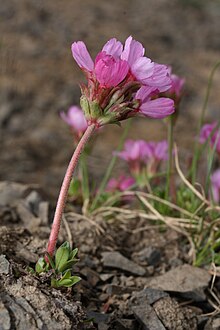Androsace
| Androsace | |
|---|---|
 |
|
| Androsace laevigata in Olympic National Park, United States | |
| Scientific classification | |
| Kingdom: | Plantae |
| (unranked): | Angiosperms |
| (unranked): | Eudicots |
| (unranked): | Asterids |
| Order: | Ericales |
| Family: | Primulaceae |
| Genus: |
Androsace L. |
| Sections | |
|
Andraspis
Aizoidium
Pseudoprimula |
|
 |
|
Andraspis
Aretia
Aizoidium
Douglasia
Chamaejasme
Pseudoprimula
Vitaliana
Androsace, commonly known as rockjasmine, is a genus in the family Primulaceae, second only to Primula in number of species. It is a predominantly Arctic–alpine genus with many species in the Himalayas (where the genus originated), the mountains of central Asia, the Caucasus, and the southern and central European mountain systems, particularly the Alps and the Pyrenees.
Plants of this genus are sometimes known as rock jasmines or fairy candelabras and are widely cultivated for their dense cushions covered in white or pink flowers. There are about 110 species.
Recent molecular studies show that the genera Douglasia (found in north-western North America and easternmost Siberia), Pomatosace (an Himalayan endemic) and Vitaliana (a European endemic) are nested within Androsace. Phylogenetic studies have also demonstrated that the ancestor of Androsace first appeared about 35 Mya ago and was most probably an annual species. Evolution towards the denser morphology of cushions took place two times independently in Asia and in Europe.
The Plant List recognises the following 170 species, including those formerly placed in Douglasia:
...
Wikipedia
